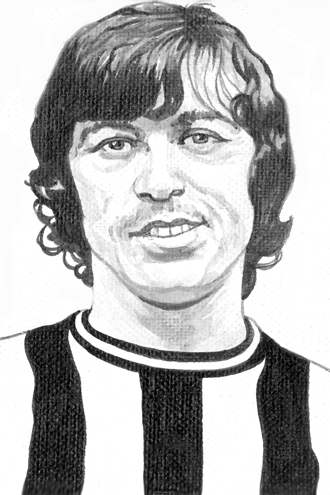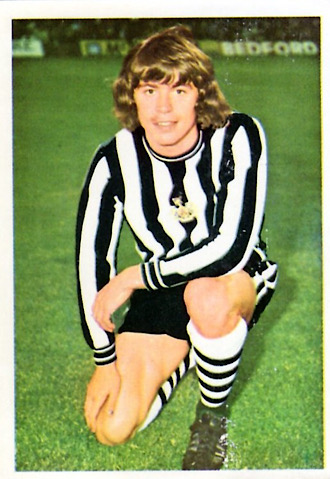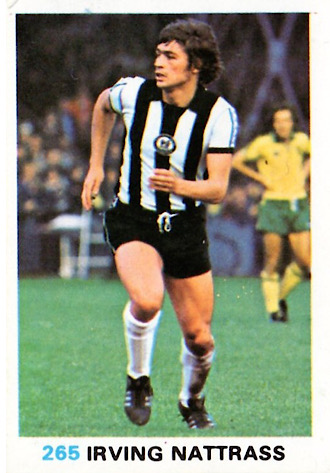


| Bth | 12/12/52 | Fishburn | Co Durham |
| P/H/W | RB | 5’ 10” | |
| Jnd | 1967 | junior | |
| Pro | 07/70 | ||
| Deb | 27/03/71 | Derby (H) | D1 |
| Dep | 08/79 | Middlesbrough | £475,000 |
| App/Gls | 300 (13) | 22 |
United manager Joe Harvey once said that "Nattrass is my Paul Madeley and I can't pay him a bigger compliment than that". Madeley was a Leeds and England player who was dubbed the "Rolls Royce" of footballers for his classy displays as either a midfielder or defender.
Not only did Nattrass share the Leeds' stars polish, he also matched his versatility by excelling at full-back, central defender, sweeper and midfielder.
Irving had pace, poise and perception. When he was on the ball he was calm and comfortable in possession. When he didn't he was sharp in the tackle and quick on the turn. He had a decent range of passing, but kept his passes simple.
Nattrass stated that his first coach and manager (Burkinshaw and Harvey) were the biggest influences on his career and there is no doubt that the admiration was mutual.
Keith Burkinshaw was tipping him to win full international honours from an early stage. "He's quick. People find it hard to go past him because he is such a good tackler, and his anticipation is exceptional".
Senior players were just as impressed with the teenager. Macdonald praised his maturity and described him as the best player in his age group in the country. Terry Hibbitt was impressed with how he kept the game simple. "He gets it and shoves it around quickly for us, he's never in trouble because he's got all the necessary strength and pace"
But his skills didn't stop there. When he married show jumper Joan Little he turned to farming in his spare time and his spouse enthused "Irving can drive the tractor, herd the sheep and even ride my horses".
When Joe Harvey was asked about him in 1973 he believed he had the world at his feet. "The next ten years can see him reaching dizzy heights. He must win the top honours in the game".
But when Irving was forced to retire through injury at the end of the 1985-86 season (aged 33) all he had to show for his time in the game was a single England U23 cap and a League Cup runners up medal.
The lack of honours is easy to explain; for starters he played for United and when he moved on in July 1979 his desire to stay in the North East took him to Middlesbrough. Other clubs such as Tottenham were interested but Irving decided to stay closer to home.
He later stated that he regretted having left United but to be fair to him the club was in a desperate state having only managed a mid-table finish in the Second Division. But his main reason for leaving appears to have been manager Bill McGarry whom Nattrass described as a "horrible man".
The lack of international recognition is slightly more complicated. Playing in the North East didn't help and playing in the Second Division when his career should have been at its peak was also a factor. Recurrent injury problems denied him opportunities and Irving himself believes that he burnt a few bridges of his own when he turned down the opportunity of going on tour with the England "B" team.
Despite his lack of international recognition there is no doubt he is one of the classiest United defenders of modern times.
Ferryhill Grammar school pupil Irving failed to make much of an impact as a schoolboy. But despite only managing one game for the district side, United scout Harry Nattrass liked what he saw and he joined on schoolboy forms as a fourteen year old.
At 16 he signed on as an apprentice, but quiet and lacking in confidence, his progress was slow. Stuck in the fourth team he started to look for employment outside and actually fixed up a job as a mechanic. Thankfully he stayed and signed professionally in July 1970 at the age of 17.
Nattrass had only just signed professional during the summer but was rewarded for some excellent displays with the juniors and reserves by being called into first team action.
Nattrass (aged 18) made his debut as he replaced John Craggs in the 3-1 victory at home over Derby. Two tremendous tackles on Archie Gemmill dispelled any doubts about his ability to cope. He made his full debut in the last game of the season when he deputised for Moncur as sweeper at Coventry.
Nattrass received rave reports for his cultured displays and Harvey believed he could go "right to the top". Skipper Moncur compared him with the classy Colin Todd.
Had a five-month run in the side in which he was usually utilised as a defensive midfielder and scored his first goals.
Everybody was impressed with his mature performances and Burkinshaw was delighted that despite his quietness he was asserting himself on the pitch.
Hibbitt said it was the simplicity of his game that stood out: "he gets it and shoves it around quickly". Captain Moncur was full of admiration. "Definitely one for the future. He is inclined to get easily depressed with his progress. If only he rated himself as highly as the rest of the senior players do".
Although he missed the start of the season with a strained thigh and also suffered a spinal injury early on he was again given an extended run in the side as a defensive midfielder.
Harvey said: “I look on Irving as a younger version of Paul Madely - he plays with the same unruffled, unhurried style and he can perform in half-a-dozen positions”. He did so well that he was called up for the England U23 squad for the game against Czechoslovakia in March although he did not play.
With David Craig injured, Irving moved to right back, but he suffered a terrible knee ligament injury in the League match at Birmingham which ruled him out from December. As a result he missed out on a Wembley visit although he thought he was fit enough to play.
Nattrass was back from his serious knee injury and established himself as the first choice right back. He also had a couple of run outs in midfield as Harvey tried to add a bit of bite early in the season.
New manager Gordon Lee was just as impressed as Harvey and regarded Nattrass as one of his key players. Irving was one of a number of players who played in the League Cup final despite being unfit.
With government pay restrictions blocking wage rises Nattrass asked for a transfer. Although Lee had gone on record stating that anybody not happy would be allowed to go he was adamant that Nattrass must stay.
The promise of a testimonial (which he never received) persuaded him to change his mind and Nattrass goes on to have his best season for the club.
Unlucky to be thrust out in front of the media when player power threatened to cause anarchy at St James'. The senior pros who were the ringleaders (Nulty, Burns and Gowling) chose to stay in the shadows as the players passed a vote of "no confidence" in the board.
Nattrass was one of many players out of contract in the summer of 1977 but he eventually joined the rest of the "rebels" in re-signing. United never recovered from a terrible start and were relegated with Nattrass having to fill in across the back four.
Leeds and Bolton both offered £300,000 to sign him in the summer, but McGarry was determined to keep a player he regarded as an "outstanding talent".
Nattrass admitted that relegation had dispirited him and he was seriously considering leaving but he eventually signed a "lucrative" new contract after "the boss went out and bought quality players who can take us back into the first Division".
Missed the start of the season due to an achilles tendon injury suffered during a pre-season friendly and then after a few games back his leg was in plaster and he would be out until the New Year.
On his return he was almost back to his best and was used in midfield, central-defence and full-back wearing six different shirts in all. And he replaced Hibbitt as captain for the last few weeks of the season.
Nattrass finally ended his twelve year association with United in August 1979 when he joined Middlesbrough for £475,000. He spent seven seasons at Ayresome Park where he clocked up over 200 appearances despite recurrent injury problems.
Painting by Piotr
Cards/stickers from DT92.com